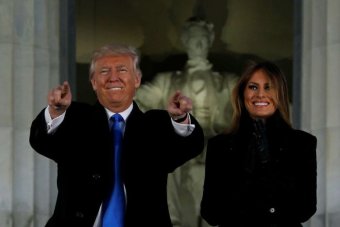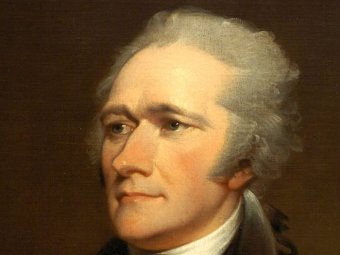A tale of three New Yorkers: Donald Trump, Alexander Hamilton and Lin Manuel Miranda
Updated
As Donald Trump begins the fourth week of a presidency which has blasted through Washington with the speed of a sirocco, the 70-year-old US President shows no signs of slowing down.
Over the weekend, he and First Lady Melania Trump were all smiles as they wined and dined the Japanese Prime Minister and his wife.
But Twitter reveals Mr Trump's fury over the greatest defeat of his young administration - Friday's smack down by the 9th Circuit Court of Appeals.
The US appellate court unanimously upheld a Washington State decision to suspend a ban on travel to the US from seven predominantly Muslim countries.
Relieved passengers took advantage of the reprieve to take to the skies, America bound. A vexed President Trump vented his anger at the judiciary in ALL CAPS:
The White House says its travel ban is popular with many Americans and says all options are on the table, including issuing a new and presumably better-vetted executive order.
But as that effort continues, Mr Trump's scathing critique of judges and the courts has provoked widespread criticism, even alarm. David Axelrod, former Senior Advisor to President Obama, opined:
And:
Mr Trump's nominee to fill the vacancy on the US Supreme Court blundered into the fray when he told a US Senator attacks on the judiciary are "disheartening" and "demoralising".
The White House promptly clarified that Neil Gorsuch spoke generally and was not criticising President Trump.
Make no mistake, a battle royal is brewing over the limits of presidential power.
The New York real-estate-developer-turned-president primed for "action and impact", in Counsel Kellyanne Conway's words, has discovered a Washington home truth.
Contentious executive orders will come under fire from battalions of briefcase-brandishing lawyers. Not just in DC, but across the country.
Heady early days of Trump presidency have surprising historical precedent
What's fascinating to note as this complex legal drama unfolds is the intriguing ancillary role an American immigrant already has played in the debate about how much power to give a president.
A headstrong, hot-headed auto-didact, a penniless polymath with a penchant for fast talk and fancy clothes who left the Caribbean as a teenager to seek his fortune in - where else? - New York City.
That remarkable immigrant never met Donald J Trump. It would have been difficult. Alexander Hamilton died in a duel some 140 years before Mr Trump was born.
But his remarkable contributions to American civic life are now world famous due to a third New Yorker, Lin Manuel Miranda; playwright and composer of the smash Broadway musical in which he also played the title role.
Hamilton captured 11 Tony Awards, made headlines when its multicultural cast lectured US Vice-President Mike Pence and prompted scores of people, including me, to purchase historian Ron Chernow's Hamilton biography which inspired Miranda.
The musical begins:
How does a bastard, orphan, son of a whore and a Scotsman, dropped in the middle of a forgotten spot in the Caribbean by providence, impoverished, in squalor, grow up to be a hero and a scholar?
Hero, scholar, soldier, lawyer, politician, Treasury Secretary, founder of both The New York Post and the Coast Guard, "right-hand man" to George Washington, and - drumroll please - perhaps the person most responsible for getting the US Constitution ratified.
In Hamilton, history is a triple-threat. Actors rap about the revolution, dance about democracy, create thrilling theatre not just about love and war but cabinet battles.
They even croon about the Constitution, which Hamilton defends in The Federalist Papers.
"John Jay got sick after writing five. James Madison wrote twenty-nine. Hamilton wrote ... the other fifty-one!"
Hamilton to blame for some of Trump's current troubles
Because of Hamilton & Friends, the US Constitution got support from states and became the Law of the Land.
Thus, Alexander Hamilton must receive some credit - or blame, depending on perspective - for the trouble Mr Trump finds himself in with this executive order.
True, Hamilton believed in a strong executive. But he believed even more strongly in checks and balances.
 Photo:
Donald Trump is currently battling the courts over his executive order on immigration. (Reuters: Jonathan Ernst)
Photo:
Donald Trump is currently battling the courts over his executive order on immigration. (Reuters: Jonathan Ernst)
Hamilton fretted about absolute power. He could imagine some future British prince trying to lay claim to an American throne. And he wasn't alone.
Jefferson's Declaration of Independence minced no words about King George III, even pulling out the Capital Letter to decry "Despotism" and "Tyranny".
The founding fathers had such mistrust of Royalty they even rejected the title 'Your Excellency' for their country's leader in favour of the homespun 'Mr President'.
But while the colonies united to win their War of Independence, they nearly fractured trying to decide how to work together as one nation.
The Framers of the Constitution wanted a document firm enough to create certainty, yet flexible enough to stand the test of time.
It wasn't easy. They fought a lot.
As George Washington admonishes Hamilton in the musical, "Winning was easy young man. Governing's harder."
George Washington, Thomas Jefferson, James Madison - these men are legends, their contributions to the US well-known to Americans.
But as Manuel's Hamilton explores, had it not been for the contributions of an upstart immigrant to New York, history might have turned out differently.
The separation of powers represented in architecture
On a frigid day last December, I took our 15-year-old Australian-American daughter on a civics tour of Washington, DC.
We visited the People's House, the US Capitol.
We admired the highest court in the land, the stately Supreme Court. We watched workers construct viewing stands next to the White House for the upcoming Inauguration of the 45th President of the United States.
The three branches of government - legislative, executive, judicial - as inspiration and architecture.
In a democratic mood, I purchased a little pamphlet entitled: THE DECLARATION OF Independence and the CONSTITUTION OF THE United States of America.
It's remarkable how tiny this booklet is given how these two documents shape-shifted the world.
I thumbed through the pages again this weekend.
We the people of the United States, in order to form a more perfect Union...
It still gives me chills.
But the Constitution is elegantly simple. It's basically an 18th century political 'How to' manual.
Article I establishes Congress. For the founders, the people's representatives came first.
Article II establishes the presidency and sets the term at four years.
Article III creates the Supreme Court, and "such inferior courts as the Congress may from time to time ordain and establish".
The Constitution also states:
The judicial Power shall extend to all Cases, in Law and Equity, arising under this Constitution.
Hamilton half imagined Trump
Later, my daughter and I ducked inside the cosy National Portrait Gallery to see the "Ten-dollar founding father without a father" who has become the toast of Broadway.
Hamilton's portrait shows a man with a sharp nose, sharper eyes, grey hair, a black frock coat and a frothy white shirt which I am compelled to report bears an uncanny resemblance to a pussycat bow blouse.
Hamilton stares off into the distance - into the future - I'm sure with a knowing smile.
He didn't need to meet President Trump to imagine him. He had always half-expected a future President with a gift for gab (after all, he had one too), and a keen desire to use the power of the office to its fullest extent.
He had fought for independence with a cannon, with a gun. He fought for the Constitution with a quill.
"If Jefferson provided the essential poetry of American political discourse, Hamilton established the prose of American statecraft.
No other founder articulated such a clear and prescient vision of American future political, military and economic strength or crafted such ingenious mechanisms to bind the nation together," historian Chernow tells us in the prologue to Alexander Hamilton.
The battle over President Trump's executive order, and the extent of presidential power, likely will continue this week.
And what about those other two New Yorkers?
Lin Manuel Miranda is up for an Oscar for How Far I'll Go from his score for the movie Moana.
If he wins, he'll be the youngest member of what's called the EGOT circle - the rare quadruple-threat who wins an Emmy, Grammy, Oscar and Tony. So that he doesn't get bored, he'll also star with Emily Blunt in Mary Poppins Returns.
And Manuel's hip-hop Hamilton remains the toast of Broadway. I haven't seen the show yet, but given its relevance, I can't afford to miss it.
That's why I've taken out a second mortgage ... and bought two tickets for September.
Topics: world-politics, government-and-politics, donald-trump, opera-and-musical-theatre, arts-and-entertainment, united-states
First posted










